2024年中考英语课件:话题二十四 故事与诗歌课件(共48张PPT)
文档属性
| 名称 | 2024年中考英语课件:话题二十四 故事与诗歌课件(共48张PPT) |  | |
| 格式 | pptx | ||
| 文件大小 | 605.9KB | ||
| 资源类型 | 教案 | ||
| 版本资源 | 人教新目标(Go for it)版 | ||
| 科目 | 英语 | ||
| 更新时间 | 2024-05-11 15:49:15 | ||
图片预览

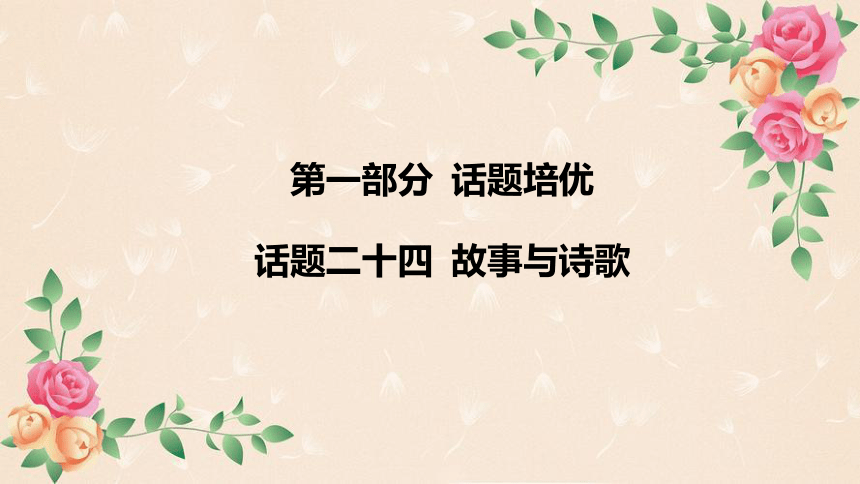
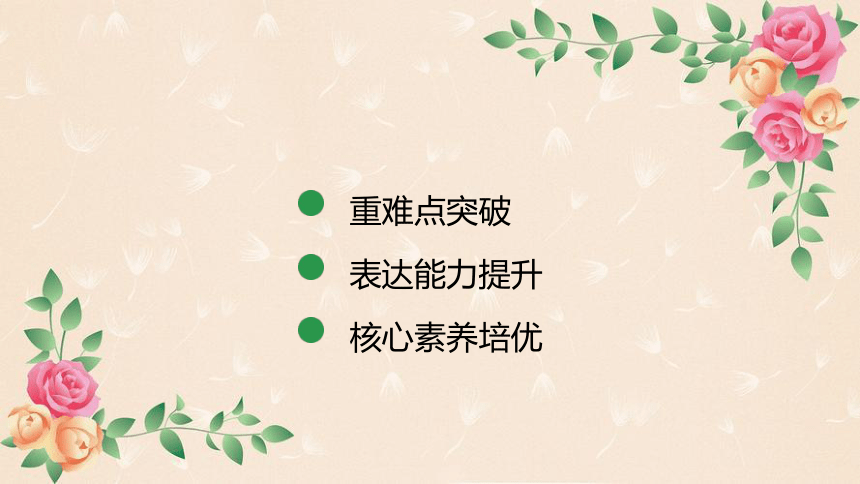
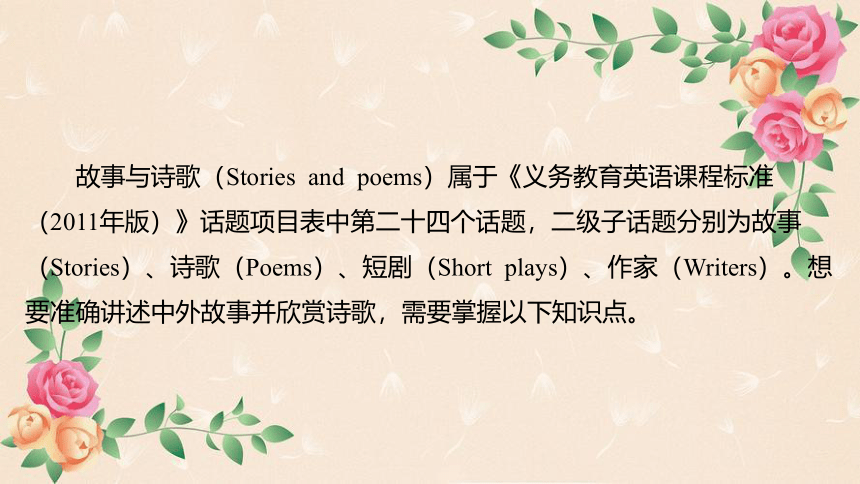

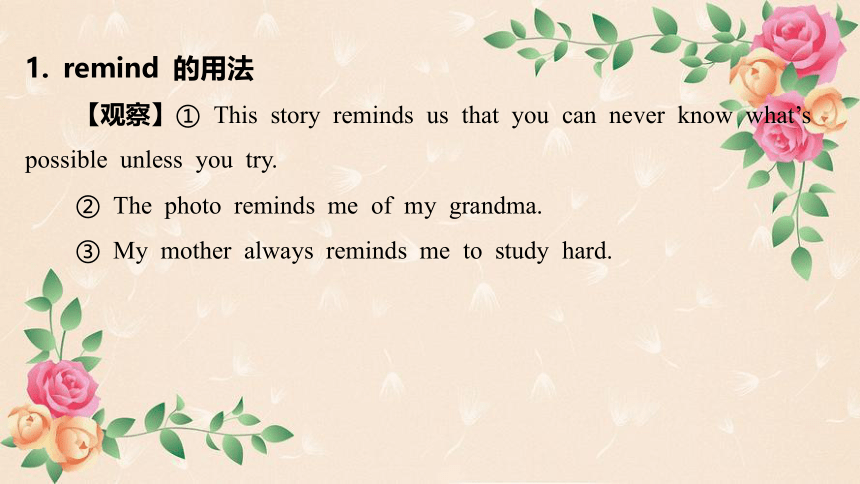
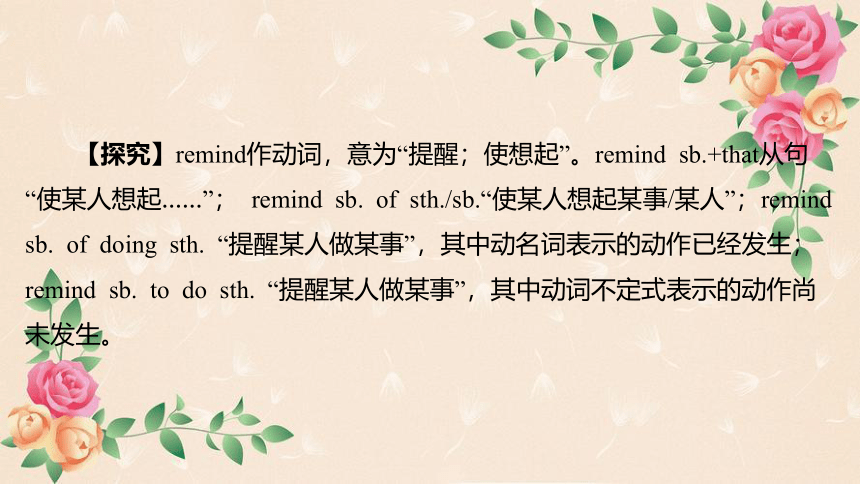
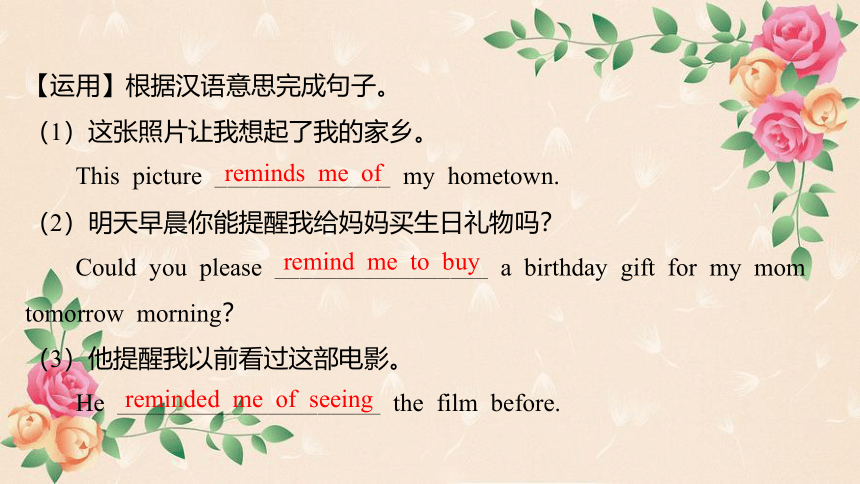
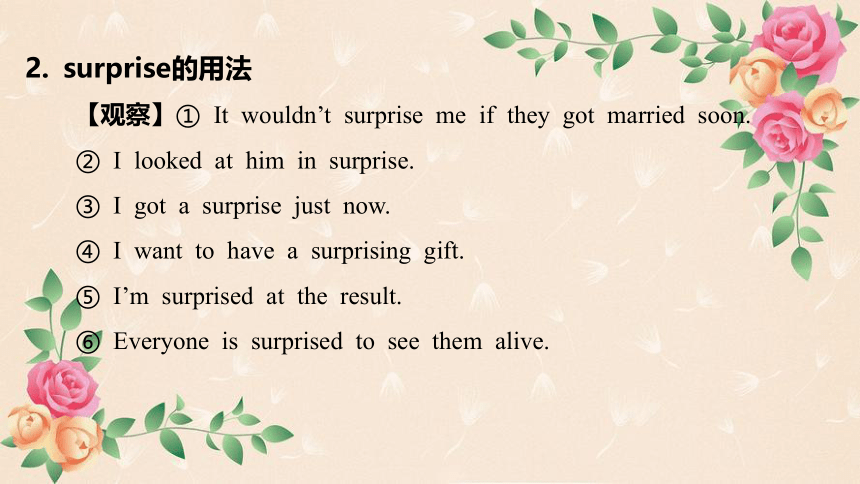
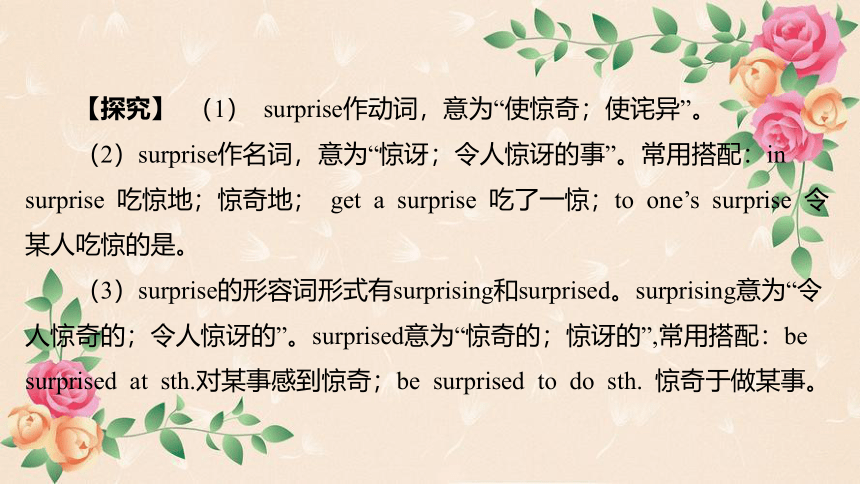
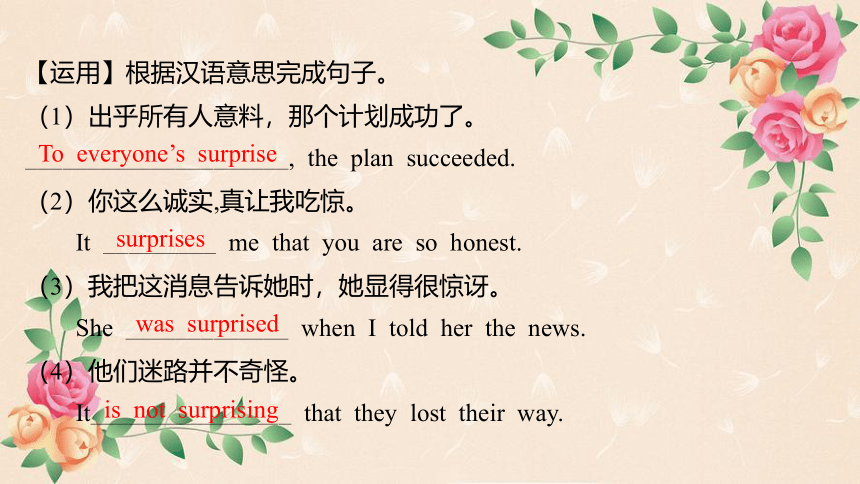
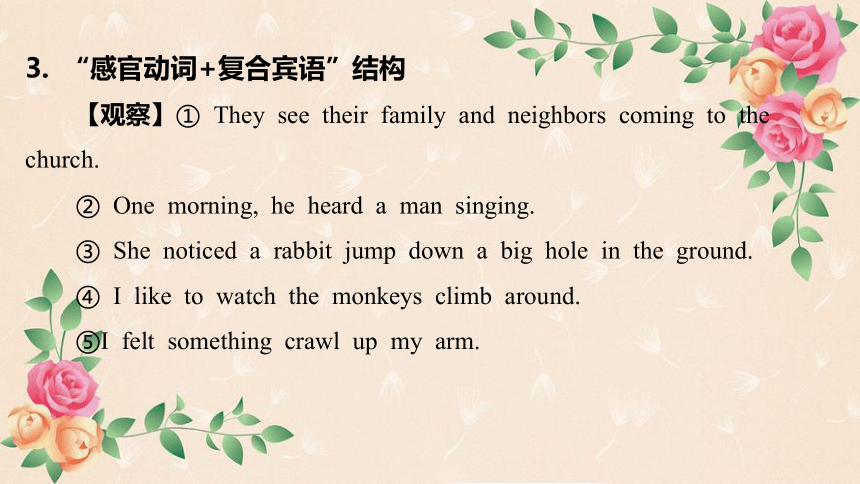
文档简介
(共48张PPT)
2024年中考英语课件
第一部分 话题培优
话题二十四 故事与诗歌
重难点突破
表达能力提升
核心素养培优
故事与诗歌(Stories and poems)属于《义务教育英语课程标准(2011年版)》话题项目表中第二十四个话题,二级子话题分别为故事(Stories)、诗歌(Poems)、短剧(Short plays)、作家(Writers)。想要准确讲述中外故事并欣赏诗歌,需要掌握以下知识点。
重难点突破
01
1. remind 的用法
【观察】① This story reminds us that you can never know what’s possible unless you try.
② The photo reminds me of my grandma.
③ My mother always reminds me to study hard.
【探究】remind作动词,意为“提醒;使想起”。remind sb.+that从句“使某人想起……”; remind sb. of sth./sb.“使某人想起某事/某人”;remind sb. of doing sth. “提醒某人做某事”,其中动名词表示的动作已经发生;remind sb. to do sth. “提醒某人做某事”,其中动词不定式表示的动作尚未发生。
【运用】根据汉语意思完成句子。
(1)这张照片让我想起了我的家乡。
This picture ______________ my hometown.
reminds me of
(2)明天早晨你能提醒我给妈妈买生日礼物吗?
Could you please _________________ a birthday gift for my mom
tomorrow morning?
remind me to buy
(3)他提醒我以前看过这部电影。
He _____________________ the film before.
reminded me of seeing
2. surprise的用法
【观察】① It wouldn’t surprise me if they got married soon.
② I looked at him in surprise.
③ I got a surprise just now.
④ I want to have a surprising gift.
⑤ I’m surprised at the result.
⑥ Everyone is surprised to see them alive.
【探究】 (1) surprise作动词,意为“使惊奇;使诧异”。
(2)surprise作名词,意为“惊讶;令人惊讶的事”。常用搭配:in surprise 吃惊地;惊奇地; get a surprise 吃了一惊;to one’s surprise 令某人吃惊的是。
(3)surprise的形容词形式有surprising和surprised。surprising意为“令人惊奇的;令人惊讶的”。surprised意为“惊奇的;惊讶的”,常用搭配:be surprised at sth.对某事感到惊奇;be surprised to do sth. 惊奇于做某事。
【运用】根据汉语意思完成句子。
(1)出乎所有人意料,那个计划成功了。
_____________________, the plan succeeded.
To everyone’s surprise
(2)你这么诚实,真让我吃惊。
It _________ me that you are so honest.
surprises
(3)我把这消息告诉她时,她显得很惊讶。
She _____________ when I told her the news.
was surprised
(4)他们迷路并不奇怪。
It________________ that they lost their way.
is not surprising
3. “感官动词+复合宾语”结构
【观察】① They see their family and neighbors coming to the church.
② One morning, he heard a man singing.
③ She noticed a rabbit jump down a big hole in the ground.
④ I like to watch the monkeys climb around.
⑤I felt something crawl up my arm.
【探究】see, hear, watch, notice, feel等都属于感官动词,其后可接复合宾语。
(1)接不带to的不定式作宾语补足语,表示动作发生的全过程。
(2)接现在分词作宾语补足语,表示动作正在进行。
【运用】根据汉语意思完成句子。
(1)我看到他弹钢琴了。
I saw him _____the piano.
play
(2)我看到他正在弹钢琴。
I saw him ________ the piano.
用括号内所给单词的适当形式填空。
playing
(3)—Do you often hear John_____ (sing)in his room
—Yes. Listen! Now we can hear him ________ (sing) in his
room.
sing
singing
4. 辨析happen与take place
【观察】① An accident happened in that street.
② Great changes have taken place in my hometown during the past ten years.
【探究】(1)happen意为“发生;碰巧”,表示事情的发生带有偶然性,其后可接to sb./sth.。
(2)take place意为“发生;举行;举办”,一般指事情按计划发生,无偶然之意。
【运用】根据汉语意思完成句子。
(1)这起车祸发生在上个星期。
The car accident _________ last week.
happened
(2)班会将于明天举行。
The class meeting will __________ tomorrow.
take place
单项选择。
(3)Can you tell me what happened ___ him just now
C
A.with B.for C.to D.at
5. 辨析ago与before
【观察】① He bought this book three weeks ago.
② I have never read the books by Hemingway before.
【探究】ago 与before都表示“……之前”。ago用在表示时间的词之后,指从现在算起的一段时间之前,常用于一般过去时;before既可用在表示时间的词之前,指某一时间之前,用于多种时态,也可单独使用,常用于现在完成时。
【运用】根据汉语意思完成句子。
(1)三年前他完成了他的小说。
He finished writing his novel_______________.
three years ago
(2)八点前两个孩子回到了家。
The two children came back home ________________.
before 8 o’clock
(3)你们以前看过这部剧吗?
Have you ever watched this play _______
before
表达能力提升
02
Ⅰ.补全对话
根据下面对话中的情境,在每个空白处填入一个适当的语句,使对话
恢复完整。
A: Hi, Brian. 1.___________________________________
B: No, I haven’t. I just started writing my homework. Ms. Cao said
we could write a story or a poem as our homework, right
A: Yes. I feel that it’s easier to write a story.
Have you finished your homework yet
B:2.pared with poems,
stories usually have longer passages. Every story must have a beginning,
a middle and an end. It takes too much time to write a story, doesn’t it
A:3.___________. But a story doesn’t limit you like a poem does.
With poems, you need to think about format, rhyme and meaning. You
must use words very carefully because so few words are used in poems.
B: I know.4.____________________________________________.
I don’t think so/I don’t agree with you
Yes,it does
But I still think it’s easier to write a short poem
A: Maybe you are right. It’s easier to write a short poem.
B: I want to describe something I love. Why not do our homework together now
A:5.__________. Let’s do it now.
Good idea
Ⅱ.书面表达
(2022·安徽中考)假定你是李辉。你的英国朋友迈克想阅读中国经典名著。请你写封邮件,向他推荐《西游记》。要点如下:
1.风趣幽默,深受喜爱;
2.团队合作,历险克难;
3.追逐梦想,永不言弃。
要求:1.可适当增加细节,以使行文连贯;
2.词数:不少于70。(邮件的开头已给出,但不计入总词数。)
参考词汇:character n.人物,overcome v.克服
Dear Mike,
Since you want to read Chinese classic works, I’d like to recommend Journey to the West to you.
________________________________________________________________________________________________________________________________________________________________________________________________________________________________________________________________________________________________________________________________________________________________________________________________
The book Journey to the West was written by Wu Cheng’en during the Ming Dynasty. It tells a story about the Tang monk Xuanzang and his three disciples. The book is humorous and well received. In the book, the four main characters show teamwork as they overcame numerous difficulties. Finally, they attained the true Buddhist scriptures. This story tells us to chase our dreams and never give up.
___________________________________________________________________________________________________________________
Yours,
Li Hui
You are bound to enjoy yourself while reading the novel and you can share with me your opinions whenever you like.
核心素养培优
03
Ⅰ.完形填空
(2022·连云港中考改编)阅读下面短文,理解大意,从所给的四个选项中选出一个最佳答案,使短文连贯完整。
Zu Ti was a great man of the Jin Dynasty. He was . .1. . for his hard work and great achievements. But when he was a child, he was a naughty (顽皮的) boy who showed little . .2. . in reading. As he grew up, Zu Ti . .3. . he didn’t have enough knowledge. And he deeply felt that he could not serve his country well. So he made up his mind to study hard.
Zu Ti had a close friend named Liu Kun. They had a deep friendship. So they stayed together every day. They even slept on one bed every night and . .4. . at the same time every morning. One day, when they were . .5. ., Zu Ti heard the rooster crowing (打鸣). An . .6. . came to him. He woke up Liu Kun and said, “How about getting up to play swords (剑) ”Though he was still sleepy, Liu Kun agreed with Zu Ti gladly. From then on, they got up and played swords . .7. . the rooster began crowing. They kept their words day after
day. They never gave up no matter how cold in winter or hot in summer. Besides, they began to study history . .8. . and put all their energy into reading books. . .9. ., they learned a great deal of knowledge and made much progress. A few years later, both of them grew up with talents and wisdom. At last, their . .10. . came true and they made great contributions to their country.
This is the Chinese idiom story To Rise with the Rooster.
1.( )A.ready B.famous C.late D.sorry
B
2.( )A.pride B.respect C.interest D.kindness
C
3.( )A.realized B.decided C.imagined D.promised
A
4.( )A.picked up B.got up C.gave up D.made up
B
5.( )A.fighting B.discussing C.sleeping D.reading
C
6.( )A.order B.idea C.exam D.ability
B
7.( )A.as well as B.as much as C.as good as D.as soon as
D
8.( )A.carefully B.politely C.probably D.recently
A
9.( )A.In this way B.By the way
C.In their way D.On his way
A
10.( )A.mistakes B.dreams C.hobbies D.difficulties
B
Ⅱ.阅读理解
(2021·南京中考)阅读下面短文, 从所给的四个选项中选出能回答所提问题或完成所给句子的一个最佳答案。
To improve your reading, you can try the form of readers’ theatre, a formatted (编排) script for readers to read aloud. It’s so interesting!
Cast of Characters: Narrator, Kayla, Ms. Lee, Zack
Narrator: On a sunny day in southern Texas, Ms. Lee’s students gathered in the school playground.
Ms. Lee: Tomorrow is the day of the sidewalk(人行道)chalk-art festival. The principal has allowed us to practice our wet-chalk drawing on the playground sidewalk, which will be our studio. Remember, whenever you want to draw on a sidewalk, always ask an adult in charge for permission before you draw. Now let’s review the steps of wet-chalk drawing. What do we do first
Narrator: As the students told her the steps in order, Ms. Lee wrote them on a large pad of paper. When she finished writing, she pulled the paper off the pad and displayed the directions so everyone could read them. Then the students chose and soaked (浸湿)their pieces of chalk. Meanwhile, Kayla and Zack planned their drawing.
Kayla: Let’s draw a jungle feast. Parrots can be eating all kinds of fruit.
Zack: I’ll draw a model train carrying food to the birds.
Narrator: The students removed their pieces of chalk from the water and drew. As Zack drew a sweeping curve of train track, his hand knocked over the jar of water. He and Kayla watched water streak across their drawing.
Zack: Our drawing is ruined(毁坏)!
Kayla: Don’t be so worried! Quick, mix the water and the chalk together! Now let’s use more chalk and smear(涂抹)it around.
Narrator: Kayla and Zack worked quickly. The smeared colors looked glorious, like rich, thick frosting on a cake.
Ms. Lee: That looks great! That’s a special method you’re using, kids. Are you two interested in taking part in the chalk-art festival tomorrow The timetable for the festival says that drawing starts at 9:00 a.m.
Kayla and Zack: Sure!
Kayla: Tomorrow we’ll pour water over our drawing on purpose.. .
Zack: Then we’ll know just what to do!
1.What do we know about the readers’theatre ( )
C
A.A place for readers to enjoy plays.
B.A reading material for people to read aloud.
C.A series of steps for children to draw on the sidewalk.
D.A number of people gathering together to play games.
2.What does the underlined word “streak” in the passage mean ( )
B
A.Rise rapidly. B.Move quickly.
C.Disappear suddenly. D.Swim slowly.
3.The narrator in the readers’ theatre ___.
D
A.tells the whole story in a silent way
B.gives instructions to the characters
C.helps the characters understand the story
D.describes settings and events
4.What does the underlined sentence “Tomorrow we’ll pour water over
our drawing on purpose.” at the end of the passage mean ( )
D
A.Kayla and Zack will ruin their drawing with water for fun.
B.Kayla and Zack will find the steps by accident by themselves.
C.Kayla and Zack will draw as well as their teacher by pouring water.
D.Kayla and Zack will draw pictures using the method they discovered today.
Ⅲ.短文填空
(2022·怀化中考改编)用方框中所给单词的适当形式填空,使短文完整正确。(每个单词限用一次,每空限填一个单词。)
China, love, fight, make, brave,
animal, smart, he, come, interest
Journey to the West is a traditional 1. ________ book. The monkey
king or Sun Wukong is one of the main characters in the book. The
monkey king, who is 2.______ by Chinese children, is not just a normal
monkey. He can make 72 changes to 3.____ shape and size, turning
himself into different 4.________ and objects. The monkey king uses a
magic stick to fight bad people 5.________. Sometimes, he can 6.______
the stick so small that he can keep it in his ear. And as soon as the TV
programme 7.______ out more than 30 years ago, children became
8._________ in reading this story. The monkey king is 9.________ than
others. He keeps 10.________ to help the weak and never gives up.
Chinese
loved
his
animals
bravely
make
came
interested
smarter
fighting
Ⅳ.任务型阅读
(2022·陕西中考)阅读下面短文,根据短文内容,完成下列各题。
My name is Xue Mingwen, a middle school student. My brother is two years younger than me. He is now in Grade 6 at a primary school. Both of us like reading famous stories and we often share storybooks. Some stories are famous because people have been telling them for many years. Others, such as fables (寓言), are famous because they have an excellent ending or teach a good lesson—a moral in other words.
The other day, my brother shared a very old story from an English storybook. Both of us were attracted (吸引) by the new, useful language in the fable that everyone can tell. Although the story was simple, it was educational. It is our decision that we should share it here. We hope you can learn more words and a new way or two of expressing your ideas in English after you read this fable.
1.Who is Xue Mingwen
He is most probably a ___________ of Grade ________.
boy/student
8/Eight
2.What was Xue Mingwen’s opinion of the old story according to
Paragraph 2
He thought it was ________________________.
simple and/but educational
3.How did the two brothers decide to deal with the story after reading it
They decided to ______________________ with readers.
share (it / the story)
4.What is the name of the fable here
It is _________________________.
The Hare and the Tortoise
5.What new word(s), phrase(s) or sentence(s) can you learn from
the old story above
I can learn ______________________________________________,
________________________________________________________________
________________________________________________________________
________________________________________________________________
____and more.
hare/ tortoise/ snooze/ plod/ hop/ cabbage (s)/…
give him a head start / fall asleep among the cabbages / have time
to snooze/(couldn’t) catch up / hop fast / slowly plod past/…// I’m so
much bigger and better than you. / Bigger doesn’t always mean better.
/…
thanks
2024年中考英语课件
第一部分 话题培优
话题二十四 故事与诗歌
重难点突破
表达能力提升
核心素养培优
故事与诗歌(Stories and poems)属于《义务教育英语课程标准(2011年版)》话题项目表中第二十四个话题,二级子话题分别为故事(Stories)、诗歌(Poems)、短剧(Short plays)、作家(Writers)。想要准确讲述中外故事并欣赏诗歌,需要掌握以下知识点。
重难点突破
01
1. remind 的用法
【观察】① This story reminds us that you can never know what’s possible unless you try.
② The photo reminds me of my grandma.
③ My mother always reminds me to study hard.
【探究】remind作动词,意为“提醒;使想起”。remind sb.+that从句“使某人想起……”; remind sb. of sth./sb.“使某人想起某事/某人”;remind sb. of doing sth. “提醒某人做某事”,其中动名词表示的动作已经发生;remind sb. to do sth. “提醒某人做某事”,其中动词不定式表示的动作尚未发生。
【运用】根据汉语意思完成句子。
(1)这张照片让我想起了我的家乡。
This picture ______________ my hometown.
reminds me of
(2)明天早晨你能提醒我给妈妈买生日礼物吗?
Could you please _________________ a birthday gift for my mom
tomorrow morning?
remind me to buy
(3)他提醒我以前看过这部电影。
He _____________________ the film before.
reminded me of seeing
2. surprise的用法
【观察】① It wouldn’t surprise me if they got married soon.
② I looked at him in surprise.
③ I got a surprise just now.
④ I want to have a surprising gift.
⑤ I’m surprised at the result.
⑥ Everyone is surprised to see them alive.
【探究】 (1) surprise作动词,意为“使惊奇;使诧异”。
(2)surprise作名词,意为“惊讶;令人惊讶的事”。常用搭配:in surprise 吃惊地;惊奇地; get a surprise 吃了一惊;to one’s surprise 令某人吃惊的是。
(3)surprise的形容词形式有surprising和surprised。surprising意为“令人惊奇的;令人惊讶的”。surprised意为“惊奇的;惊讶的”,常用搭配:be surprised at sth.对某事感到惊奇;be surprised to do sth. 惊奇于做某事。
【运用】根据汉语意思完成句子。
(1)出乎所有人意料,那个计划成功了。
_____________________, the plan succeeded.
To everyone’s surprise
(2)你这么诚实,真让我吃惊。
It _________ me that you are so honest.
surprises
(3)我把这消息告诉她时,她显得很惊讶。
She _____________ when I told her the news.
was surprised
(4)他们迷路并不奇怪。
It________________ that they lost their way.
is not surprising
3. “感官动词+复合宾语”结构
【观察】① They see their family and neighbors coming to the church.
② One morning, he heard a man singing.
③ She noticed a rabbit jump down a big hole in the ground.
④ I like to watch the monkeys climb around.
⑤I felt something crawl up my arm.
【探究】see, hear, watch, notice, feel等都属于感官动词,其后可接复合宾语。
(1)接不带to的不定式作宾语补足语,表示动作发生的全过程。
(2)接现在分词作宾语补足语,表示动作正在进行。
【运用】根据汉语意思完成句子。
(1)我看到他弹钢琴了。
I saw him _____the piano.
play
(2)我看到他正在弹钢琴。
I saw him ________ the piano.
用括号内所给单词的适当形式填空。
playing
(3)—Do you often hear John_____ (sing)in his room
—Yes. Listen! Now we can hear him ________ (sing) in his
room.
sing
singing
4. 辨析happen与take place
【观察】① An accident happened in that street.
② Great changes have taken place in my hometown during the past ten years.
【探究】(1)happen意为“发生;碰巧”,表示事情的发生带有偶然性,其后可接to sb./sth.。
(2)take place意为“发生;举行;举办”,一般指事情按计划发生,无偶然之意。
【运用】根据汉语意思完成句子。
(1)这起车祸发生在上个星期。
The car accident _________ last week.
happened
(2)班会将于明天举行。
The class meeting will __________ tomorrow.
take place
单项选择。
(3)Can you tell me what happened ___ him just now
C
A.with B.for C.to D.at
5. 辨析ago与before
【观察】① He bought this book three weeks ago.
② I have never read the books by Hemingway before.
【探究】ago 与before都表示“……之前”。ago用在表示时间的词之后,指从现在算起的一段时间之前,常用于一般过去时;before既可用在表示时间的词之前,指某一时间之前,用于多种时态,也可单独使用,常用于现在完成时。
【运用】根据汉语意思完成句子。
(1)三年前他完成了他的小说。
He finished writing his novel_______________.
three years ago
(2)八点前两个孩子回到了家。
The two children came back home ________________.
before 8 o’clock
(3)你们以前看过这部剧吗?
Have you ever watched this play _______
before
表达能力提升
02
Ⅰ.补全对话
根据下面对话中的情境,在每个空白处填入一个适当的语句,使对话
恢复完整。
A: Hi, Brian. 1.___________________________________
B: No, I haven’t. I just started writing my homework. Ms. Cao said
we could write a story or a poem as our homework, right
A: Yes. I feel that it’s easier to write a story.
Have you finished your homework yet
B:2.pared with poems,
stories usually have longer passages. Every story must have a beginning,
a middle and an end. It takes too much time to write a story, doesn’t it
A:3.___________. But a story doesn’t limit you like a poem does.
With poems, you need to think about format, rhyme and meaning. You
must use words very carefully because so few words are used in poems.
B: I know.4.____________________________________________.
I don’t think so/I don’t agree with you
Yes,it does
But I still think it’s easier to write a short poem
A: Maybe you are right. It’s easier to write a short poem.
B: I want to describe something I love. Why not do our homework together now
A:5.__________. Let’s do it now.
Good idea
Ⅱ.书面表达
(2022·安徽中考)假定你是李辉。你的英国朋友迈克想阅读中国经典名著。请你写封邮件,向他推荐《西游记》。要点如下:
1.风趣幽默,深受喜爱;
2.团队合作,历险克难;
3.追逐梦想,永不言弃。
要求:1.可适当增加细节,以使行文连贯;
2.词数:不少于70。(邮件的开头已给出,但不计入总词数。)
参考词汇:character n.人物,overcome v.克服
Dear Mike,
Since you want to read Chinese classic works, I’d like to recommend Journey to the West to you.
________________________________________________________________________________________________________________________________________________________________________________________________________________________________________________________________________________________________________________________________________________________________________________________________
The book Journey to the West was written by Wu Cheng’en during the Ming Dynasty. It tells a story about the Tang monk Xuanzang and his three disciples. The book is humorous and well received. In the book, the four main characters show teamwork as they overcame numerous difficulties. Finally, they attained the true Buddhist scriptures. This story tells us to chase our dreams and never give up.
___________________________________________________________________________________________________________________
Yours,
Li Hui
You are bound to enjoy yourself while reading the novel and you can share with me your opinions whenever you like.
核心素养培优
03
Ⅰ.完形填空
(2022·连云港中考改编)阅读下面短文,理解大意,从所给的四个选项中选出一个最佳答案,使短文连贯完整。
Zu Ti was a great man of the Jin Dynasty. He was . .1. . for his hard work and great achievements. But when he was a child, he was a naughty (顽皮的) boy who showed little . .2. . in reading. As he grew up, Zu Ti . .3. . he didn’t have enough knowledge. And he deeply felt that he could not serve his country well. So he made up his mind to study hard.
Zu Ti had a close friend named Liu Kun. They had a deep friendship. So they stayed together every day. They even slept on one bed every night and . .4. . at the same time every morning. One day, when they were . .5. ., Zu Ti heard the rooster crowing (打鸣). An . .6. . came to him. He woke up Liu Kun and said, “How about getting up to play swords (剑) ”Though he was still sleepy, Liu Kun agreed with Zu Ti gladly. From then on, they got up and played swords . .7. . the rooster began crowing. They kept their words day after
day. They never gave up no matter how cold in winter or hot in summer. Besides, they began to study history . .8. . and put all their energy into reading books. . .9. ., they learned a great deal of knowledge and made much progress. A few years later, both of them grew up with talents and wisdom. At last, their . .10. . came true and they made great contributions to their country.
This is the Chinese idiom story To Rise with the Rooster.
1.( )A.ready B.famous C.late D.sorry
B
2.( )A.pride B.respect C.interest D.kindness
C
3.( )A.realized B.decided C.imagined D.promised
A
4.( )A.picked up B.got up C.gave up D.made up
B
5.( )A.fighting B.discussing C.sleeping D.reading
C
6.( )A.order B.idea C.exam D.ability
B
7.( )A.as well as B.as much as C.as good as D.as soon as
D
8.( )A.carefully B.politely C.probably D.recently
A
9.( )A.In this way B.By the way
C.In their way D.On his way
A
10.( )A.mistakes B.dreams C.hobbies D.difficulties
B
Ⅱ.阅读理解
(2021·南京中考)阅读下面短文, 从所给的四个选项中选出能回答所提问题或完成所给句子的一个最佳答案。
To improve your reading, you can try the form of readers’ theatre, a formatted (编排) script for readers to read aloud. It’s so interesting!
Cast of Characters: Narrator, Kayla, Ms. Lee, Zack
Narrator: On a sunny day in southern Texas, Ms. Lee’s students gathered in the school playground.
Ms. Lee: Tomorrow is the day of the sidewalk(人行道)chalk-art festival. The principal has allowed us to practice our wet-chalk drawing on the playground sidewalk, which will be our studio. Remember, whenever you want to draw on a sidewalk, always ask an adult in charge for permission before you draw. Now let’s review the steps of wet-chalk drawing. What do we do first
Narrator: As the students told her the steps in order, Ms. Lee wrote them on a large pad of paper. When she finished writing, she pulled the paper off the pad and displayed the directions so everyone could read them. Then the students chose and soaked (浸湿)their pieces of chalk. Meanwhile, Kayla and Zack planned their drawing.
Kayla: Let’s draw a jungle feast. Parrots can be eating all kinds of fruit.
Zack: I’ll draw a model train carrying food to the birds.
Narrator: The students removed their pieces of chalk from the water and drew. As Zack drew a sweeping curve of train track, his hand knocked over the jar of water. He and Kayla watched water streak across their drawing.
Zack: Our drawing is ruined(毁坏)!
Kayla: Don’t be so worried! Quick, mix the water and the chalk together! Now let’s use more chalk and smear(涂抹)it around.
Narrator: Kayla and Zack worked quickly. The smeared colors looked glorious, like rich, thick frosting on a cake.
Ms. Lee: That looks great! That’s a special method you’re using, kids. Are you two interested in taking part in the chalk-art festival tomorrow The timetable for the festival says that drawing starts at 9:00 a.m.
Kayla and Zack: Sure!
Kayla: Tomorrow we’ll pour water over our drawing on purpose.. .
Zack: Then we’ll know just what to do!
1.What do we know about the readers’theatre ( )
C
A.A place for readers to enjoy plays.
B.A reading material for people to read aloud.
C.A series of steps for children to draw on the sidewalk.
D.A number of people gathering together to play games.
2.What does the underlined word “streak” in the passage mean ( )
B
A.Rise rapidly. B.Move quickly.
C.Disappear suddenly. D.Swim slowly.
3.The narrator in the readers’ theatre ___.
D
A.tells the whole story in a silent way
B.gives instructions to the characters
C.helps the characters understand the story
D.describes settings and events
4.What does the underlined sentence “Tomorrow we’ll pour water over
our drawing on purpose.” at the end of the passage mean ( )
D
A.Kayla and Zack will ruin their drawing with water for fun.
B.Kayla and Zack will find the steps by accident by themselves.
C.Kayla and Zack will draw as well as their teacher by pouring water.
D.Kayla and Zack will draw pictures using the method they discovered today.
Ⅲ.短文填空
(2022·怀化中考改编)用方框中所给单词的适当形式填空,使短文完整正确。(每个单词限用一次,每空限填一个单词。)
China, love, fight, make, brave,
animal, smart, he, come, interest
Journey to the West is a traditional 1. ________ book. The monkey
king or Sun Wukong is one of the main characters in the book. The
monkey king, who is 2.______ by Chinese children, is not just a normal
monkey. He can make 72 changes to 3.____ shape and size, turning
himself into different 4.________ and objects. The monkey king uses a
magic stick to fight bad people 5.________. Sometimes, he can 6.______
the stick so small that he can keep it in his ear. And as soon as the TV
programme 7.______ out more than 30 years ago, children became
8._________ in reading this story. The monkey king is 9.________ than
others. He keeps 10.________ to help the weak and never gives up.
Chinese
loved
his
animals
bravely
make
came
interested
smarter
fighting
Ⅳ.任务型阅读
(2022·陕西中考)阅读下面短文,根据短文内容,完成下列各题。
My name is Xue Mingwen, a middle school student. My brother is two years younger than me. He is now in Grade 6 at a primary school. Both of us like reading famous stories and we often share storybooks. Some stories are famous because people have been telling them for many years. Others, such as fables (寓言), are famous because they have an excellent ending or teach a good lesson—a moral in other words.
The other day, my brother shared a very old story from an English storybook. Both of us were attracted (吸引) by the new, useful language in the fable that everyone can tell. Although the story was simple, it was educational. It is our decision that we should share it here. We hope you can learn more words and a new way or two of expressing your ideas in English after you read this fable.
1.Who is Xue Mingwen
He is most probably a ___________ of Grade ________.
boy/student
8/Eight
2.What was Xue Mingwen’s opinion of the old story according to
Paragraph 2
He thought it was ________________________.
simple and/but educational
3.How did the two brothers decide to deal with the story after reading it
They decided to ______________________ with readers.
share (it / the story)
4.What is the name of the fable here
It is _________________________.
The Hare and the Tortoise
5.What new word(s), phrase(s) or sentence(s) can you learn from
the old story above
I can learn ______________________________________________,
________________________________________________________________
________________________________________________________________
________________________________________________________________
____and more.
hare/ tortoise/ snooze/ plod/ hop/ cabbage (s)/…
give him a head start / fall asleep among the cabbages / have time
to snooze/(couldn’t) catch up / hop fast / slowly plod past/…// I’m so
much bigger and better than you. / Bigger doesn’t always mean better.
/…
thanks
